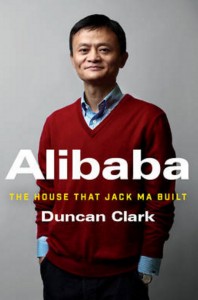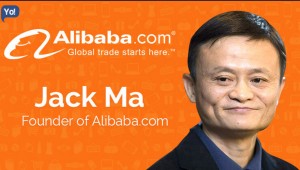
Jack Ma the architect behind Alibaba’s blue print for online success

Duncan Clark a former Morgan Stanley investment consultant who runs the Beijing-based tech consultancy BDA, was invited to visit the lakeside apartment of Jack Ma, in 1999. The story of the evolution of Chinese Internet, particularly the rise of the south of China, Clark tells an interesting story about a conference for entrepreneurs held in 1984 by the government of Wenzhou, a city in Mr Ma’s home province Zhejiang. Some entrepreneurs who were invited refused to attend, fearing arrest, and some who showed up brought toothbrushes in case they were detained.
The flat was the nerve centre of a new company that Jack Ma had named Alibaba a few months before as he wanted to sell things online in China, a country then there was hardly internet penetration or popularity.
The book is must read for all would be entrepreneurs hoping to navigate China’s new economy. China’s Internet will soon become part of everyone’s life thanks largely due to Ma’s efforts. Clark treat us with unique quote from Ma such as
“ The Internet is like beer….. the good stuff is at the bottom. Without the bubbles, the beer is flat and nobody would want to drink it”.
Taobao, the eBay-equivalent Chinese online marketplace launched by Ma in 2003, Clark could see a virtual reflection of the bustling Yiwu wholesale market not far from Alibaba’s home city of Hangzhou and Zhejiang Ma’s native province, from where Ma got his inspirations. Clark book shows an in-depth study of how Jack Ma built one of the world’s most valuable companies—rivaling Walmart & Amazon.
All his hard work of hustling and online trading , eventually paid off in 2014, with a $25m initial public offering, the biggest of all time.
Clark had been one of the few westerners to do endless interviews of people behind China’s technology, to chart a definitive history of not only Alibaba but other Chinese household names not known in the west like Tencent, Sohu, Sina and Baidu .
Duncan Clark graphically illustrates and reveal Jack Ma the business genius and China’s crucible of entrepreneurship.
His website full of pop-up boxes, blazing floating banner ads.
Entrepreneurial energy of China’s economy has been reproduced in Taobao and Tmail. In 2011, there was a dispute over the transfer of the Alipay online payments business to a company controlled by Jack Ma, which raised fears among minority shareholders like Yahoo and SoftBank that the value of their stakes in Alibaba would be eroded. The Investors accused Ma of asset-stripping, similar to the pot calling the kettle black, only for Ma to state that there were solid regulatory reasons for his violation of corporate governance norms.
In the last chapter “Icon or Icarus”, Duncan looks at the future of Alibaba, which has not had a smooth ride from investors since it went public in 2014. By 2015 summer, Alibaba shares sank by 50 per cent and in August 2015, they fell even further below $68 IPO price for the first time.
May Yun, later known as Jack Ma, approached an Australian tourist David Morley in 1980, in Hangzhou, the southern Chinese city, to practice English. This chance meeting helped Ma to launch China’s largest e-commerce company, Alibaba Group Holding Co, two decades later. Ma developed his English through years of correspondence with the Morley family, which paved way for his first U.S. trip where he was fascinated by the Internet and was inspired to start the first web company in China.
Alibaba: The House that Jack Ma Built by Duncan Clark Ecco £18.99/ $27.99 304 pages
(ISBN: 9780062413406)


